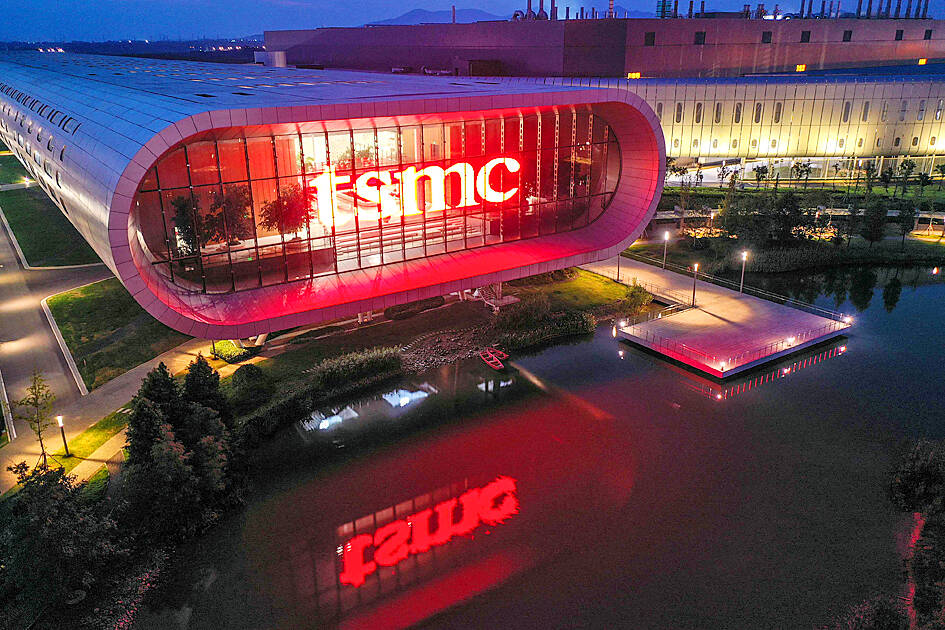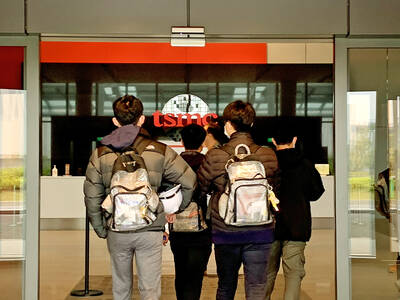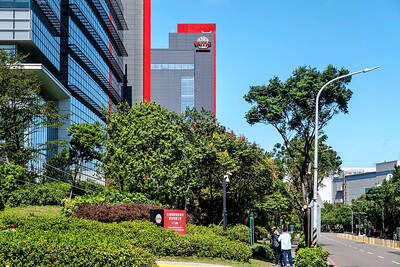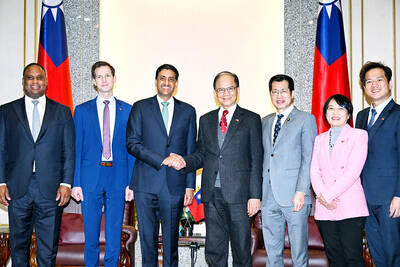Taiwan Semiconductor Manufacturing Co (TSMC, 台積電) yesterday reported annual revenue growth of 16.2 percent to NT$200.05 billion (US$6.64 billion) last month, indicating that the world’s biggest contract chipmaker and a sole chip supplier for iPhones was unfazed by quarters-long supply chain inventory corrections.
Last month’s revenue was the strongest January performance in the chipmaker’s history. On a sequential basis, revenue expanded 3.9 percent, from NT$192.56 billion in December, the company said in a statement.
However, TSMC is not immune to the supply chain correction cycles and could start seeing weaker monthly revenue from this month, as the company forecast that revenue would dip 16 to 12 percent to US$16.7 billion to US$17.5 billion this quarter, compared with US$19.93 billion last quarter.

Photo: AFP
“As customers and supply chains continue to take actions, we forecast semiconductor or inventory will reduce sharply through the first half of 2023,” TSMC CEO C.C. Wei (魏哲家) told investors last month.
The chipmaker expected revenue to decline by a mid-to-high single-digit percentage in the first half of this year with softer-than-expected demand for 7-nanometer chips used mostly in consumer electronics than it forecast in October last year, Wei said.
TSMC expects a milder pickup in demand for 7-nanometer chips in the second half than it expected three months ago, Wei said.
Separately, MediaTek Inc (聯發科) yesterday reported revenue of NT$22.38 billion for last month, down 48.55 percent year-on-year from NT$43.5 billion.
On a monthly basis, revenue dropped 42.14 percent from NT$38.69 billion in December, the world’s biggest supplier of 5G smartphone chips said.
Last month’s revenue was the lowest in 31 months, as excessive inventory depressed smartphone chip demand. Smartphone chips contributed more than half of the company’s revenue last quarter.
MediaTek earlier this month said that most customers were conservative about their business outlook and have been carefully managing their inventory.
MediaTek is a customer of TSMC.
MediaTek expected revenue to hit the bottom this quarter, paving the way for a rebound next quarter.
The company expected order visibility to improve starting next quarter, citing some early signs of mild pickup in demand for TV chips and Wi-Fi chips following an economic reopening in China.
The Hsinchu-based company projected that revenue this quarter would shrink 6 to 14 percent sequentially to NT$93 billion to NT$101.7 billion.
That would make this quarter the worst since the fourth quarter of 2020.
Global index provider MSCI Inc has raised Taiwan’s weighting in one of its major indices, but left the country’s weighting in two others unchanged.MSCI yesterday said in a statement that following a quarterly review, it increased Taiwan’s weighting in the MSCI All-Country Asia ex-Japan Index by 0.03

LOCAL INNOVATION: Hon Hai was not among the top 10 local patent applicants, because the company assigns its research and development in the US and Japan Taiwan Semiconductor Manufacturing Co (TSMC, 台積電), the world’s largest contract chipmaker, took the top spot among patent applicants in the country for the seventh consecutive year last year, the Intellectual Property Office of the Ministry of Economic Affairs said on Friday.TSMC last year filed 1,5

QUICK REVERSAL: The move sent the chipmaker’s share price down 3.67 percent, after the billionaire investor’s company in October disclosed a major TSMC stake Warren Buffett slashed his holding of Taiwan Semiconductor Manufacturing Co (TSMC, 台積電) just months after disclosing a major stake, an unusually quick reversal by the billionaire investor that is chilling investor sentiment toward the chip giant.Buffett’s Berkshire Hathaway Inc cut its holding of TS

TSMC MEETING: The US lawmakers said the visit is not meant to provoke China, but to deepen cooperation in economic and political matters, as cross-party talks are planned The US and Taiwan should increase cooperation in manufacturing and innovation to benefit the world, a visiting US delegation said after meeting with Taiwan Semiconductor Manufacturing Co (TSMC, 台積電) founder Morris Chang (張忠謀) yesterday.US representatives Ro Khanna, Jake Auchincloss, Jonathan Jackson

ADVERSARIES: The new list includes 11 entities in China and one in Taiwan, which is a local branch of Chinese cloud computing firm Inspur Group The US added dozens of entities to a trade blacklist on Tuesday, the US Department of Commerce said, in part to disrupt Beijing’s artificial intelligence (AI) and advanced computing capabilities. The action affects 80 entities from countries including China, the United Arab Emirates and Iran, with the commerce department citing their “activities contrary to US national security and foreign policy.” Those added to the “entity list” are restricted from obtaining US items and technologies without government authorization. “We will not allow adversaries to exploit American technology to bolster their own militaries and threaten American lives,” US Secretary of Commerce Howard Lutnick said. The entities

‘SWASTICAR’: Tesla CEO Elon Musk’s close association with Donald Trump has prompted opponents to brand him a ‘Nazi’ and resulted in a dramatic drop in sales Demonstrators descended on Tesla Inc dealerships across the US, and in Europe and Canada on Saturday to protest company chief Elon Musk, who has amassed extraordinary power as a top adviser to US President Donald Trump. Waving signs with messages such as “Musk is stealing our money” and “Reclaim our country,” the protests largely took place peacefully following fiery episodes of vandalism on Tesla vehicles, dealerships and other facilities in recent weeks that US officials have denounced as terrorism. Hundreds rallied on Saturday outside the Tesla dealership in Manhattan. Some blasted Musk, the world’s richest man, while others demanded the shuttering of his

Minister of Finance Chuang Tsui-yun (莊翠雲) yesterday told lawmakers that she “would not speculate,” but a “response plan” has been prepared in case Taiwan is targeted by US President Donald Trump’s reciprocal tariffs, which are to be announced on Wednesday next week. The Trump administration, including US Secretary of the Treasury Scott Bessent, has said that much of the proposed reciprocal tariffs would focus on the 15 countries that have the highest trade surpluses with the US. Bessent has referred to those countries as the “dirty 15,” but has not named them. Last year, Taiwan’s US$73.9 billion trade surplus with the US

Prices of gasoline and diesel products at domestic gas stations are to fall NT$0.2 and NT$0.1 per liter respectively this week, even though international crude oil prices rose last week, CPC Corp, Taiwan (台灣中油) and Formosa Petrochemical Corp (台塑石化) said yesterday. International crude oil prices continued rising last week, as the US Energy Information Administration reported a larger-than-expected drop in US commercial crude oil inventories, CPC said in a statement. Based on the company’s floating oil price formula, the cost of crude oil rose 2.38 percent last week from a week earlier, it said. News that US President Donald Trump plans a “secondary